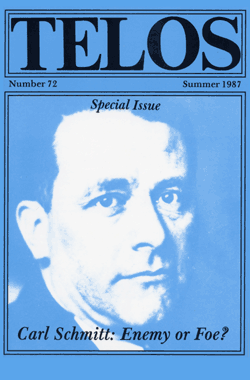As an occasional feature on TELOSscope, we highlight a past Telos article whose critical insights continue to illuminate our thinking and challenge our assumptions. Today, Juan Carlos Donado looks at Heidegger’s 1933 letter to Carl Schmitt, published under the title “Heidegger and Schmitt: The Bottom Line” in Telos 72 (Summer 1987).

The date was August 22, 1933. Only ten days before, Winston Churchill had spoken publicly for the first time about the dangers of German re-armament. Almost exactly two months later, Germany would withdraw from the League of Nations. During that same year, Martin Heidegger would controversially speak in public about Hitler’s referendum, stating: “The National Socialist revolution is not merely the taking over of a present-at-hand power in the state by another power that has grown sufficiently [strong] for it, but rather this revolution brings the complete overturning [Umwälzung] of our German Dasein.”
The occasion of the letter at hand, however, concerns the third edition of Carl Schmitt’s The Concept of the Political. As they were two of the Party’s leading intellectuals, Schmitt had sent his work to Heidegger and Heidegger, now rector of the University of Freiburg, obliged with a response. Coincidentally enough for what concerns the Zeitgeist of the German philosophical tradition, both Heidegger’s Being and Time and Schmitt’s first edition of The Concept of the Political were published in 1927. By then, however, Schmitt’s yet to be revised work lacked the note on Heraclitus’s Fragmentum 53: “War is the father of all things, the king of all things. Some he proves to be gods, others men; some he makes slaves, others free.”
Heidegger’s delight concerning the newfound presence of Heraclitus in Schmitt’s work is manifest. He writes: “Your quotation from Heraclitus was particularly pleasing to me [Ihrem Zitat von Heraklit hat mich ganz besonders gefreut],” subsequently emphasizing the importance of three concepts: that of the king, that which proves or reveals, and that which makes. Although Heidegger is explicit about having had his interpretation of Heraclitus’s fragment ready for years, scholars will only encounter his full analysis in the 1934–35 courses on “Hölderlin’s Hymns ‘Germania’ and ‘The Rhine.'”
Given the historical juncture, it is difficult to let pass such an acknowledgment of the role of war as king. Heidegger, however, immediately personalizes such war, letting Schmitt know that he himself is immersed in war and that, consequently, “all literary projects must take second place.” The war, in this case, takes a particularly interesting toll: at the face of Heidegger’s war, all literary projects become unimportant. One can only wonder if Heidegger’s employment of the term literary instead, perhaps, of the purely philosophical attests to the desire, fueled by his recurrent readings of Hölderlin and his incipient conception of the national poet as a linguistic folk hero, of making his own work an exemplary representative of the German linguistic spirit.
But things in Freiburg, says Heidegger, are rather depressing. Already prefiguring his famous 1976 Der Spiegel interview (“Only a God Can Save Us”), Heidegger complains about the need to gather the spiritual forces “that should bring about what is to come.” Heidegger’s voice speaks here with an almost prophetic clarity, for what is to come will most surely have the demonic undertones that resonate in every syllable of the word Auschwitz.
Whether Heidegger’s letter to Schmitt is yet another opportunity to reflect on the so-called affaire Heidegger or not will largely depend on the reader’s disposition. In any case, one could speak Heideggerian and say it certainly allows us to experience the author’s own written voice as a linguistic tool that is ready-at-hand.
Read the full version of “Heidegger and Schmitt: The Bottom Line” at the Telos Online website. If you are affiliated with an institution that is an online subscriber to Telos, you have free access to our complete online archive. If not, you can purchase 24-hour access to this and other Telos articles at a per-article rate. Follow the article link for more details.



